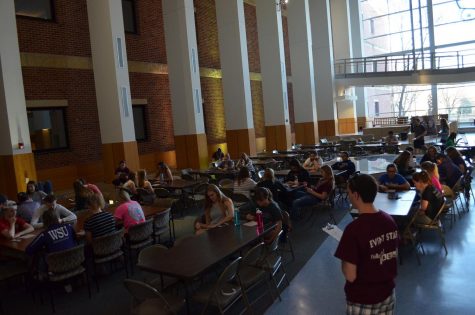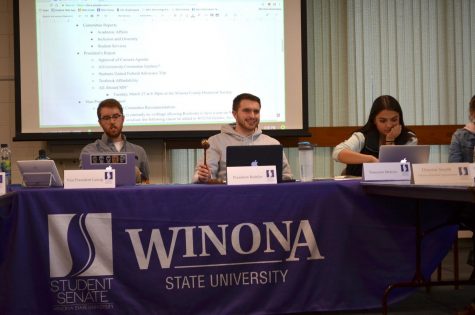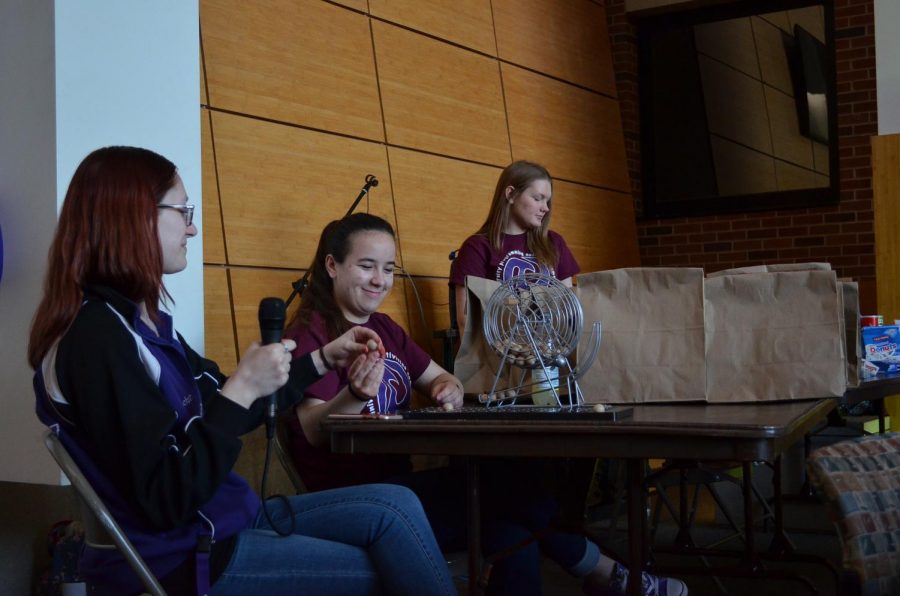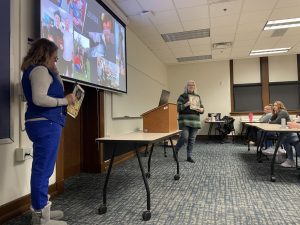Campus clubs, organizations receive compensation
Clubs with paid leadership positions speak on payment
UPAC Public Relations Print Director Adriana Coffey works the bingo cage at the club’s last monthly Grocery Bingo on Monday, April 23 in the SLC. Coffey is one of UPAC’s eight leadership positions that are paid at the end of each semester with stipends ranging from $250 to $350 a semester.
April 25, 2018
Winona State University has more than 180 clubs and organizations on campus, of which there are at least five that have paid leadership positions.
The University Programming Activities Committee (UPAC), Student Senate, The Winonan, KQAL and the Resident Housing Association (RHA) all have paid leadership potions. However, it is not known exactly how many clubs and organizations include compensation for their leaders.
Tracy Rahim, associate director of student activities and leadership and the advisor for UPAC and Student Senate, stated that the reason there is not a definite number of clubs and organizations with paid leaders is because it is up to the club and their advisor.

UPAC puts on their last monthly Grocery Bingo on Monday, April 23 in the SLC. The monthly Grocery Bingo is one of many events UPAC organizes throughout the year. UPAC has eight leadership positions that are paid at the end of each semester with stipends ranging from $250 to $350 a semester.
“That is up to them so I guess if there are others there isn’t really a need for me to know who is paid for their club positions besides the groups that I work with,” Rahim said.
Rahim continued in stating that the student payroll would be the equivalent to an overall list of every club that has paid positions.
RHA receives its budget from housing and residence life and KQAL’s paid positions are paid through a grant given to the radio station. UPAC, Student Senate and The Winonan are all paid through the student life fee.
Rahim explained that each stipend comes out of the clubs over-arching budget.
“The money comes from the student life fee. So, it’s part of their operating budget that they get from the student life fee. They section a portion of it off for the stipend,” Rahim said.
The club or organization itself decides how much of their budget they want to dedicate to paying the leaders. The club can also decide which positions are paid and which are not.
Rahim describes the stipend for leaders as an acknowledgment of their time spent on the club.
“It’s an acknowledgment of the appointed or elected leadership positions within those organizations. So, they are held to higher standards,” Rahim said.
For some of these leaders their potions within their club makes it hard for them to have a job. Student Senate President, Benjamin Reimler explained why he cannot have a job because of his presidency.
“I can’t really have another job. I think past presidents have and I think there is definitely a way to make it work, but to give some perspective, in April I have been in St. Paul probably five or six times traveling to the legislator, board of trustees and to the system office,” Reimler said.
He continued in stating that he is mostly on the road on Tuesday and Thursdays when he does not have class, as well as being in meetings on the days he is on campus. However, he stated that he was aware of the time-commitment when he was elected to the position.
“I was aware of that when I came into the position and I really wanted to give everything I had to it,” Reimler said.
Gabby Stefan, administrative office assistant of student senate explained why she finds it difficult but doable to have a job while holding a position on the senate.
“The reason why is just because with needing to be at a certain place at a certain time most days it does make it hard to make as many shifts as I would like but not as much as it would be for Ben, Chris and Christina,” Stefan said.
UPAC is paid once at the end of each semester. The Winonan is paid in increments through the semester. However, Student Senate is different. The president, vice president and treasurer are paid with the typical Winona State payroll, which is every two weeks. The other potions are paid at the end of the year.
UPAC has eight leadership positions that are paid. Their stipends range from $250 to $350 a semester. Student Senate has seven paid positions. Their stipends range from $750 to $5,000 a year.
The Winonan differs in that it is technically not a club or an organization on campus. As well as having everyone on staff earning a sum of money, the editors are paid a stipend ranging from $250 to $650 a semester. They can also earn the amount for an article or a photo if they have one published.
The writers and photographers are paid based on how much they have published. The rate is $5 per photograph and $10-20 per article.

Left to right: Student Senate Vice President Chris Latzig, President Ben Reimler and Treasurer Christina Melecio mediate a discussion during the March 13 senate meeting. Student Senate is one of the few student organizations at Winona State that have paid leadership positions, with seven paid positions that have stipends which range from $750 to $5,000 a year.
Zach Bailey, editor-in-chief of the Winonan, briefly spoke about the topic.
“Though the Winonan may be a bit like a club, I have always treated it as an on-campus job,” Bailey said. “I don’t do the job for the money, I do it for the experience, and because I love what I do. That being said, the compensation we receive works as payment for the many hours it takes each week to put the paper together.”
Both Reimler and Stefan said that they think they are compensated enough for what they do but that they do not do what they do for the money. The stipend that they earn is only a bonus they receive at the end of the school year.
Rahim stated that she believes that if UPAC wanted to raise the amount of their stipend it would be valid.
“I think for UPAC for instance if they wanted to pay their leaders more I think that they could earn more,” Rahim said. “I mean their director works, I believe six office hours a week, holds and conducts all the meetings and has to attend at least 75 percent of all the events they put on.”
Rahim also explained that she believes the leaders in Student Senate are compensated adequately after considering the behind the scenes work that they put in.
“I think for student senate looking at the amount of behind the scenes work that no one realizes that the president, vice president and the treasure do, it’s fair of how much they are getting paid along with their other committee chairs and appointed positions,” Rahim said.
Reimler expressed his appreciation for those not only in student senate but also in UPAC, RHA and KQAL and the work they put into their clubs and organizations. He stated that as a university it is important to show that those individuals are valued.
“I think again whether its student senate, UPAC, RHA, KQAL if you look at the clubs that do compensate students its well deserved. Those students are working incredibility hard and they are not being compensated like they are well below the hourly wage,” Reimler said. “So, students are not doing it for the money. They are doing it because they enjoy the work and they want to improve this campus.”
*As stated in the above article, employees of the Winonan do receive payment as photographers, writers and editors. Though both Swenson (the reporter) and Bailey (Editor-in-Chief) work for the Winonan, no bias towards the newspaper was used during the duration of this article. The Winonan believes that this was an important article to cover, but that leaving the Winonan out of the article would be bias in itself.



































